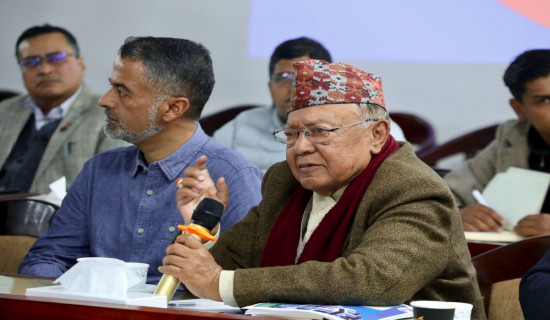- Tuesday, 23 December 2025
Securing Inclusive Growth
With the endorsement of the budget for the fiscal year 2024/25 by the House of Representatives Tuesday, the government’s initiatives for the economic reforms are expected to gain momentum. The House approved the Appropriation Bill 2024, presented by Finance Minister Barshaman Pun on May 28, with a majority vote. The Rs. 1.86 trillion annual outlay that is 6.2 per cent bigger than the unrevised budget of the current fiscal year aims to achieve 6 per cent economic growth and contain inflation at 5.5 per cent. Introduced amidst the political volatility and lingering recession, the budget has sought to boost the confidence of private sector and rekindle the hopes of ordinary beings enduring various economic hardships. It has set five objectives, five priorities, and five economic reform strategies. Its five objectives include increasing production, productivity, employment and investment, and developing human capital and reducing inequality.
The lawmakers deliberated on the budget for more than three weeks. Many of them had underlined the need for fair distribution of budget for the balanced development of all districts and regions. Prime Minister Pushap Kamal Dahal Prachanda furnished queries of lawmakers on various issues ranging from budgetary allocations to rescuing Nepalis in distress abroad to returning the encroached land in Kalapani, Lipulek and Limpiyadhura and implementing the Nepal-India Eminent Persons Group (EPG) report and Belt and Road Initiatives (BRI) projects. The PM noted that the budget has laid emphasis on equal development of all parts of country so that disparities across provinces like Karnali, Madhes, and Sudurpaschim would end through targeted budget allocations for transformative projects.
There are reductions in the current expenditures compared to the previous years so that administrative costs are slashed and policy is formulated in the spirit of federalism. Focus is also on transparency and efficiency necessary for good governance and effective service delivery. The government has pledged for people-centric governance but this calls for institutional reforms and integrated planning. The world has increasingly become interdependent that requires pursuing common economic interests among the neighbours and friendly nations. Against this backdrop, the PM has informed the parliament that efforts are underway to implement EPG report that seeks to manage border between Nepal and India in systematic manner and enhance the bilateral bond on the equal footing. Similarly, the government has taken initiative to sign the BRI projects to promote infrastructure development, the export-oriented industries, connectivity and regional economic integration.
Undoubtedly, the budget has attached priority to prudent spending, structural reforms and pragmatic approach to attain its stated objectives. However, there is the need to overcome bureaucratic hassle and release the budget in time so that development projects – big or small – do not suffer from resource crunch. Timely budget allocation also does away with the bad practice of spending money towards the end of fiscal year. Low capital spending has been a malaise that has dampened the economic prospect and growth. Lawmakers discussed the various aspects of budget, asking the government to correct its shortcomings. Their demand for judicious distribution of national resources merit attention. However, their role does not end here. They have to oversee the budget implementation. Public accountability is also equally importance for the effective implementation of budget, thereby attaining inclusive growth and sustainable development.

















